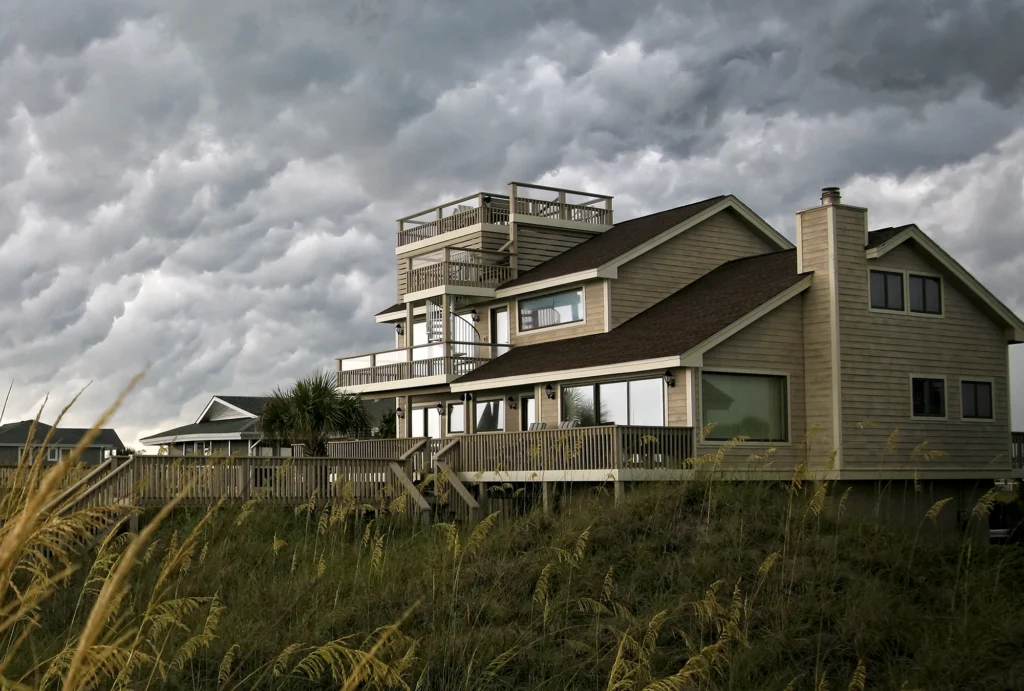Homeownership comes with many responsibilities, including protecting your property from natural disasters. As extreme weather and natural disasters occur more frequently, it’s important to know what your home insurance includes. You should also be aware of what it does not cover.
Many homeowners assume their standard insurance policy protects against all natural disasters, but that’s often not the case. Common misconceptions about coverage can leave homeowners vulnerable when disasters strike. For instance, standard policies typically do not cover flood or earthquake damage. Knowing your risks and securing additional coverage where needed can make all the difference.
Flood and hurricane insurance
Your homeowners insurance may cover water damage from a burst pipe or faulty appliance. However, a standard policy does not cover flooding caused by heavy rain, storm surges, or hurricanes. To protect against these risks, homeowners must purchase a separate flood insurance policy.
The National Flood Insurance Program (NFIP) provides coverage for flood damage. However, these policies have limitations, such as separate deductibles for building and contents and depreciation on damaged items.
Private flood insurance can provide higher coverage limits and extra protection. This includes help with temporary living costs if a flood forces you to leave your home. Depending on where you live, private policies may be more cost-effective than NFIP coverage.
Wind damage and hurricanes
If you live in a hurricane-prone region, checking your policy for a separate wind damage deductible is important. Insurance companies usually set wind deductibles based on a percentage of your home’s insured value. They do not use a fixed amount. This can lead to significant out-of-pocket costs if your home sustains damage during a storm.
Wildfire insurance challenges
If you live in an area that often has wildfires, it may be hard to find an insurer for your home. A good first step is to reach out to a local independent insurance agent. They often have access to insurers that can explore these challenges.
Earthquake insurance: A separate necessity
Standard homeowners insurance excludes earthquake damage, so a separate earthquake policy is necessary. These policies often come with high deductibles, ranging from 10% to 20% of the insured value of your home. Some states, such as California, offer specific programs like the California Earthquake Authority (CEA) to help homeowners find coverage.
Strengthening your home against disasters
Beyond insurance, there are ways to help minimize damage from natural disasters. Known as home hardening, these upgrades may qualify you for insurance discounts:
- Flood protection: Install water leak detectors, keep gutters and drainage systems clean, and consider a sump pump with backup power.
- Wind resistance: Upgrade to impact-resistant windows and doors, use better roofing materials, and secure your roof with straps or metal connectors.
- Wildfire defenses: Clear flammable vegetation near your home, install ember-resistant vents, and choose fire-resistant building materials.
- Earthquake readiness: Secure your home to its foundation, install flexible gas and water pipes, and use automatic shut-off valves to prevent leaks.
Reassess your coverage if you work from home
With remote work becoming more common, homeowners should review their policies to ensure business equipment is adequately covered. Standard policies usually provide limited coverage for business-related items. If you own a home-based business, consider a business insurance policy. Equipment breakdown coverage can protect against damage from power surges or mechanical failures.
Stay prepared and protected
Reviewing your coverage regularly and investing in the right protections can help safeguard your home and finances against unpredictable events. If you’re unsure whether your current policy provides enough coverage, contact our insurance solution specialists.
7 Surprising Homeowners Insurance Gaps
|
If you are a Mercer Advisors client and want more information about our insurance solutions, contact your wealth advisor and visit our library of insurance protection articles.
Not a Mercer Advisors client? We provide insurance advice and solutions as part of a comprehensive financial plan, along with investment management, tax planning, estate planning, and more. When you’re ready to amplify and simplify your financial life, let’s talk.
Mercer Advisors Inc. is a parent company of Mercer Global Advisors Inc. and is not involved with investment services. Mercer Global Advisors Inc. (“Mercer Advisors”) is registered as an investment advisor with the SEC. The firm only transacts business in states where it is properly registered or is excluded or exempted from registration requirements.
All expressions of opinion reflect the judgment of the author as of the date of publication and are subject to change. Some of the research and ratings shown in this presentation come from third parties that are not affiliated with Mercer Advisors. The information is believed to be accurate but is not guaranteed or warranted by Mercer Advisors. Content, research, tools and stock or option symbols are for educational and illustrative purposes only and do not imply a recommendation or solicitation to buy or sell a particular security or to engage in any particular investment strategy. For financial planning advice specific to your circumstances, talk to a qualified professional at Mercer Advisors.
Mercer Global Advisors has a related insurance agency. Mercer Advisors Insurance Services, LLC (MAIS) is a wholly owned subsidiary of Mercer Advisors Inc. MAIS provides individual life, disability, long term care coverage, and property and casualty coverage through various insurance companies. For Mercer Global Advisors clients who wish to purchase insurance products, MAIS has entered into a non-exclusive referral agreement with Strategic Partner(s), where the Strategic Partner will provide necessary services relative to the marketing, placement, and servicing of the insurance products, including without limitation preparing and presenting illustrations, supporting the underwriting process, assisting with the completion and execution of applications, delivering policies, and servicing in-force business. MAIS and the Strategic Partner will be listed as either “agents” or “co-agents” on the policies. While Mercer Global Advisors does not receive a referral fee, Strategic Partner receives a percentage of the commission revenue. MAIS and Strategic Partner do have a revenue sharing agreement.





